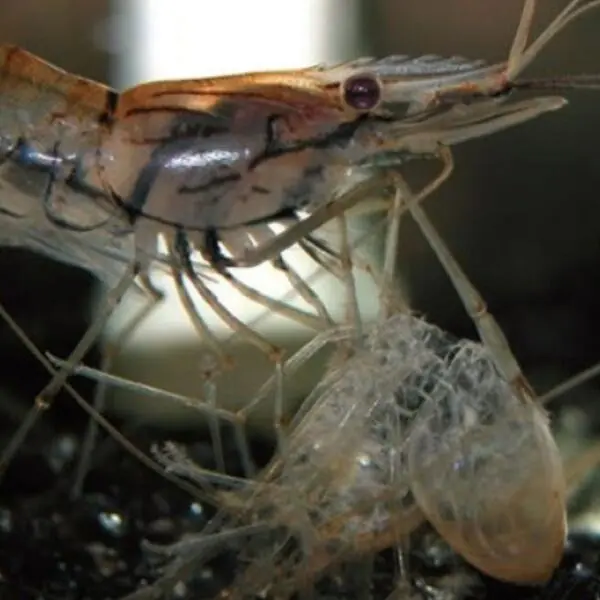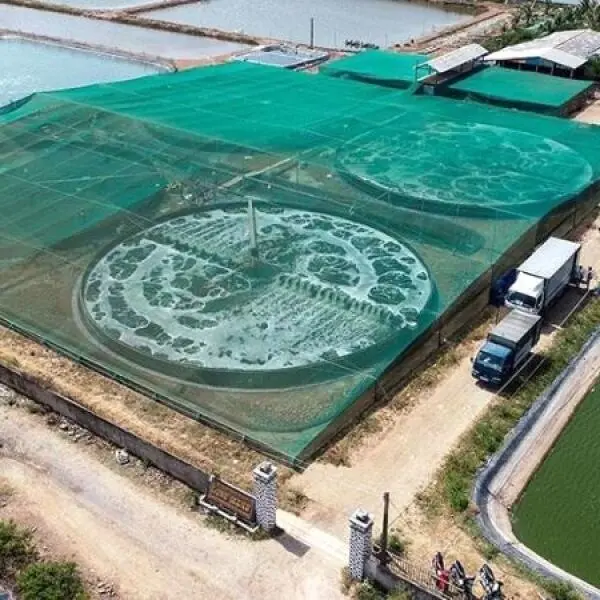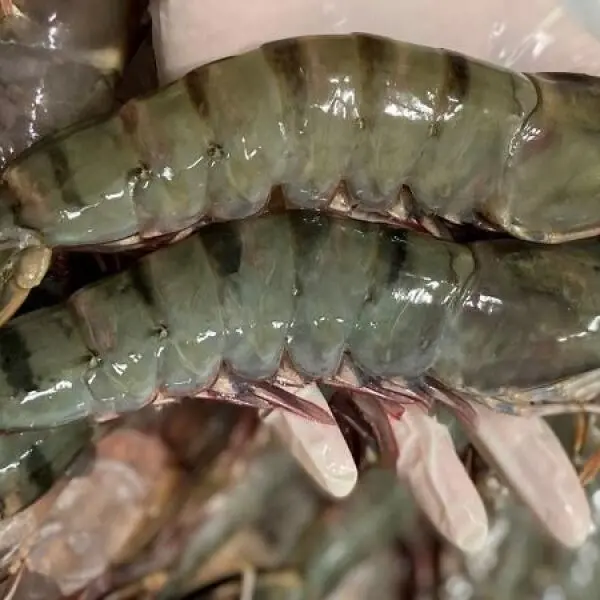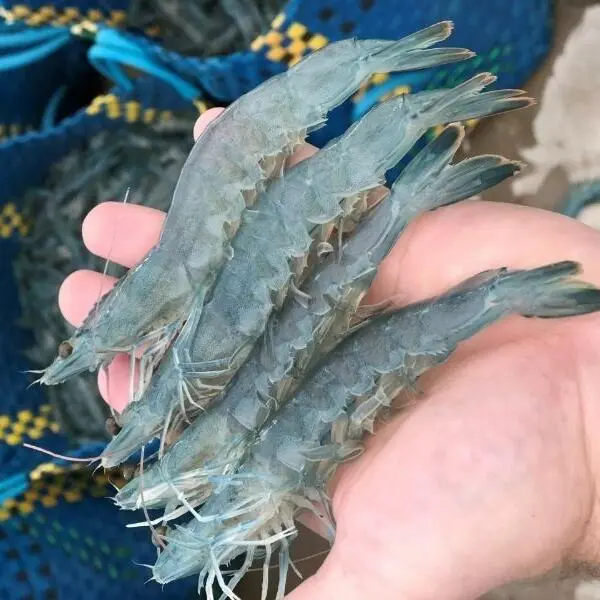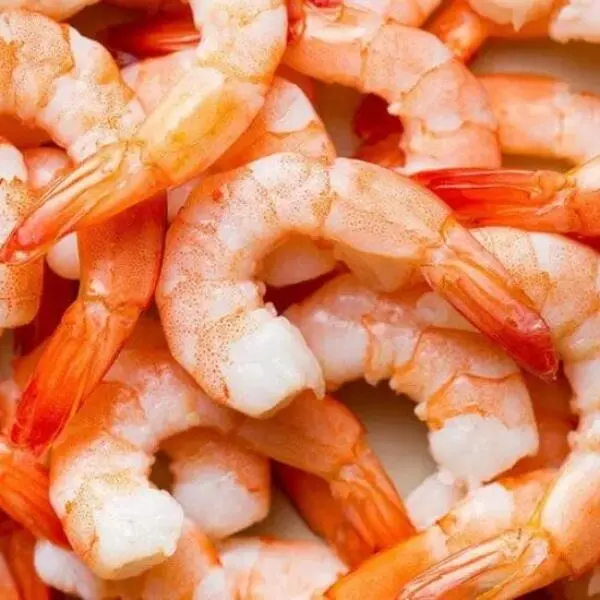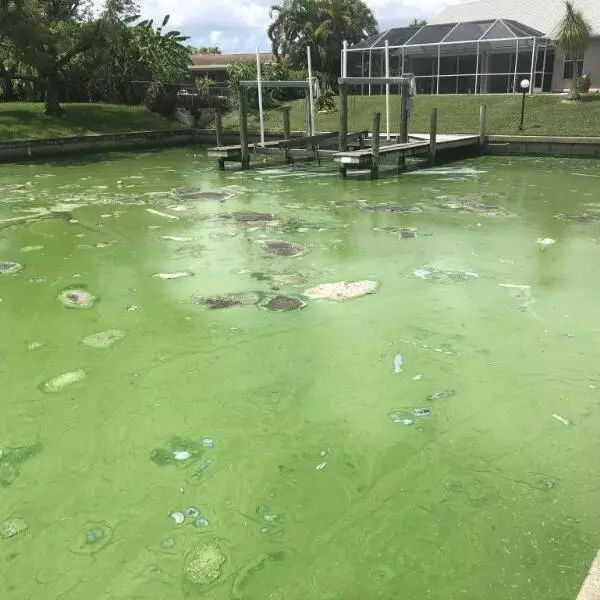
Minerals are indispensable for maintaining the overall health of shrimp. These tiny crustaceans, whether in aquariums or large-scale aquaculture systems, rely heavily on the right balance of minerals to sustain their physiological processes. This article delves into the importance of minerals for shrimp, their sources, and how they contribute to the overall well-being of shrimp populations.
How Shrimp Absorb Minerals
Shrimp primarily obtain minerals from their diet, although they can also absorb some through their aquatic environment. In freshwater systems, dietary mineral intake is especially critical, as shrimp constantly engage in osmoregulation to balance internal and external salinity levels.
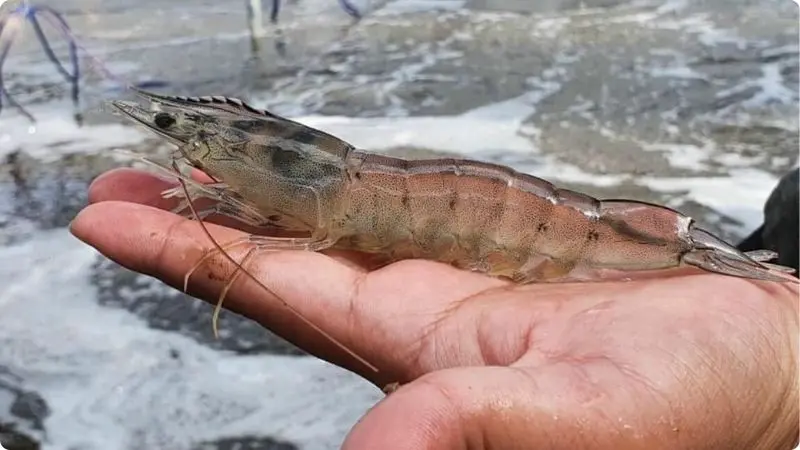
How Shrimp Absorb Minerals
Key Minerals for Shrimp and Their Functions
Calcium and Magnesium: Building Strong Shells
Calcium and magnesium are crucial for forming a robust carapace and maintaining proper bodily support. These minerals are especially needed during molting, as they help harden the new shell and stabilize vital organs. A deficiency in either mineral can lead to soft-shell syndrome or molting complications.
Potassium: Supporting Cellular Processes
Potassium regulates essential physiological activities, including cell growth, communication, and hormone production. It is also key to digesting carbohydrates and proteins. Luckily, potassium is naturally abundant in many shrimp feeds, reducing the likelihood of deficiencies.
Copper: Essential Yet Sensitive
While toxic in excessive amounts, copper is vital for shrimp. It forms hemocyanin, the blood pigment responsible for oxygen transport. The trace amounts of copper present in natural shrimp diets are typically sufficient for their needs.
Zinc: Growth and Enzyme Activation
Zinc contributes to forming body proteins and activating enzymes. It also aids in growth hormone production, making it indispensable for healthy growth and development.
Boron and Manganese: Trace Elements with Major Roles
Boron facilitates protein synthesis and carbohydrate transportation, while manganese supports enzyme functionality and metabolic activities. Both are required in minute amounts but are vital for overall health.
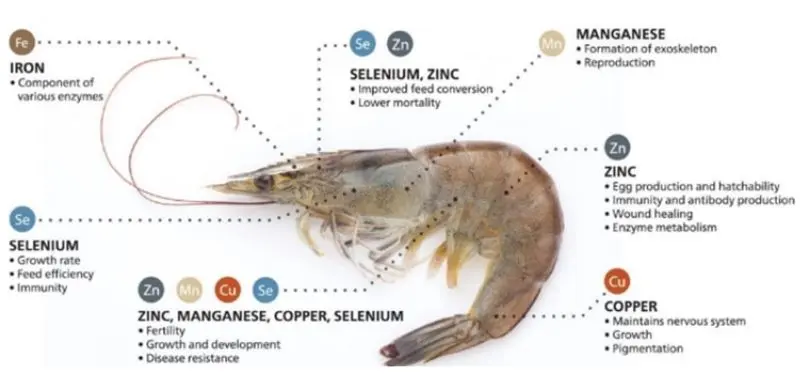
Key Minerals for Shrimp
Importance of Vitamins in Shrimp Diets
Shrimp rely on dietary sources for vitamins like A, C, D, and E since they cannot synthesize these themselves. Vitamin-rich diets not only enhance molting but also improve immunity, growth, and reproduction.
Vitamin A: Boosting Immunity and Reproductive Health
Vitamin A aids immune defense, promotes smooth molting, and supports tissue formation. A deficiency can lead to poor egg quality, increased disease susceptibility, and developmental deformities.
Vitamin D: The regulator of calcium and phosphate
Vitamin D facilitates calcium absorption and phosphate metabolism, both essential for molting and shell hardening. A deficiency can hinder growth and lead to muscle disorders.
Vitamins C and E: Antioxidants for Stress Resistance
Both vitamins help shrimp combat oxidative stress, ammonia toxicity, and environmental challenges. Their presence in algae and foliage makes them accessible components of a balanced shrimp diet.
Astaxanthin: Enhancing Color and Fertility
Astaxanthin, a carotenoid found in algae, improves shrimp coloration and has a vitamin-like effect on reproductive health and immune function.
Monitoring and Balancing Mineral Levels in Shrimp
Mineral imbalances can result in severe consequences, including molting issues, stunted growth, and increased susceptibility to diseases. For instance, calcium and magnesium deficiencies lead to weak exoskeletons, while inadequate vitamin D affects phosphate metabolism.
Minerals in Shrimp Ponds
Shrimp ponds must maintain optimal mineral levels to ensure healthy shrimp populations and high-quality harvests. Minerals in pond water stabilize pH levels, promote plankton growth, and decompose harmful compounds, contributing to a stable environment.
Two Sources of Minerals in Ponds
Minerals can come directly from feed or the aquatic environment. However, fluctuations in mineral content due to shrimp assimilation, water exchange, or seepage make regular supplementation necessary.
Monitoring and Balancing Mineral Levels
Regular testing of pond water is critical to ensure balanced mineral levels. Environmental factors, such as water salinity and organic matter decomposition, should also be considered when supplementing minerals.
Tips for Providing Minerals in Shrimp Aquaculture
Providing the right minerals is crucial for maintaining shrimp health and optimizing aquaculture production. Below are detailed strategies to ensure effective mineral supplementation in shrimp farming:
1. Select the Right Minerals
Choosing the appropriate minerals is the first step in addressing the nutritional needs of shrimp. Essential minerals such as calcium, magnesium, potassium, zinc, and copper should be prioritized. Calcium and magnesium are critical for shell hardening and molting, while trace minerals like zinc and copper support enzymatic processes and immune function. It’s important to match the mineral composition to the shrimp species and their specific requirements, particularly in different salinity conditions.
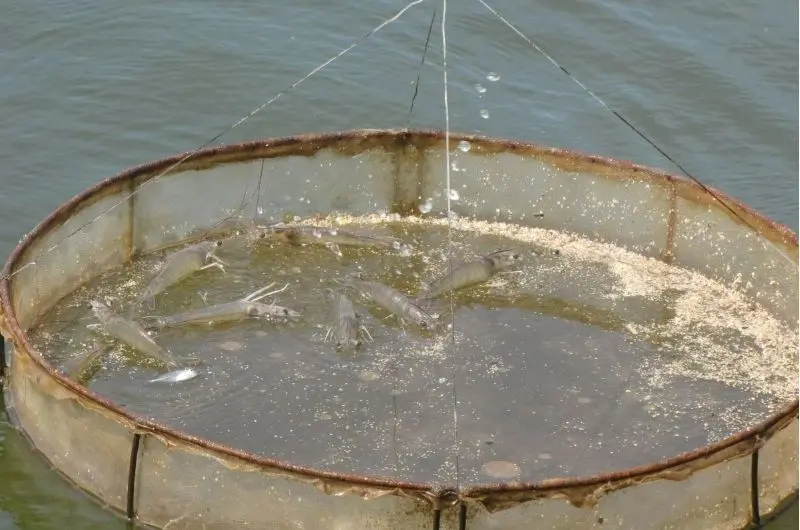
Select the Right Minerals for Shrimps
2. Monitor Dosages
Proper dosing is key to effective supplementation. Over-supplementation can harm shrimp and disrupt pond ecosystems, causing water quality issues such as increased turbidity or mineral precipitation. Conversely, under-supplementation can lead to deficiencies, resulting in poor growth, molting problems, and susceptibility to disease. Regularly measure mineral concentrations in water and feed, and adjust dosages based on shrimp density, water salinity, and growth stages.
3. Consider Water Quality
Environmental conditions, such as pH, salinity, and the presence of competing ions, significantly influence mineral absorption. For example, high pH levels can reduce the bioavailability of certain minerals, while low salinity environments increase the demand for dietary mineral supplementation. Conduct frequent water testing to ensure optimal conditions for mineral uptake. Additionally, avoid introducing heavy metals or other contaminants that may interfere with shrimp health.
4. Use Mineral-Enriched Feeds
Incorporating mineral-enriched feeds ensures a consistent supply of essential nutrients. Opt for feeds with bioavailable forms of minerals, such as chelated or organic compounds, which are easier for shrimp to absorb. Evaluate the feed composition for a balanced mineral profile tailored to the species' needs.
5. Supplement Pond Water Directly
In some cases, adding minerals directly to pond water can enhance mineral availability. Products like agricultural lime (calcium carbonate) or dolomite (magnesium and calcium carbonate) can stabilize pond pH and provide essential minerals. However, the method and frequency of application should be carefully controlled to avoid overloading the water with excess minerals.
6. Leverage Natural Sources
Encourage the growth of plankton and algae in ponds, as they can serve as natural sources of certain trace minerals. For instance, diatoms are rich in silica, which supports shrimp shell formation. Maintaining a balanced ecosystem can reduce the dependency on artificial supplementation.
7. Optimize Timing of Mineral Delivery
Timing is critical for effective mineral supplementation. For example, providing additional calcium and magnesium just before and after molting periods ensures adequate resources for exoskeleton formation. Regular feeding schedules with fortified diets can also help maintain consistent mineral levels.
8. Regular Monitoring and Adjustments of Shrimp Farms
Shrimp farms are dynamic environments, and mineral requirements may change over time due to fluctuations in water conditions, feed quality, or shrimp growth stages. Regularly monitor shrimp health, growth rates, and water quality parameters to identify potential deficiencies or excesses. Make adjustments to feeding practices, water treatments, or mineral supplementation as needed.
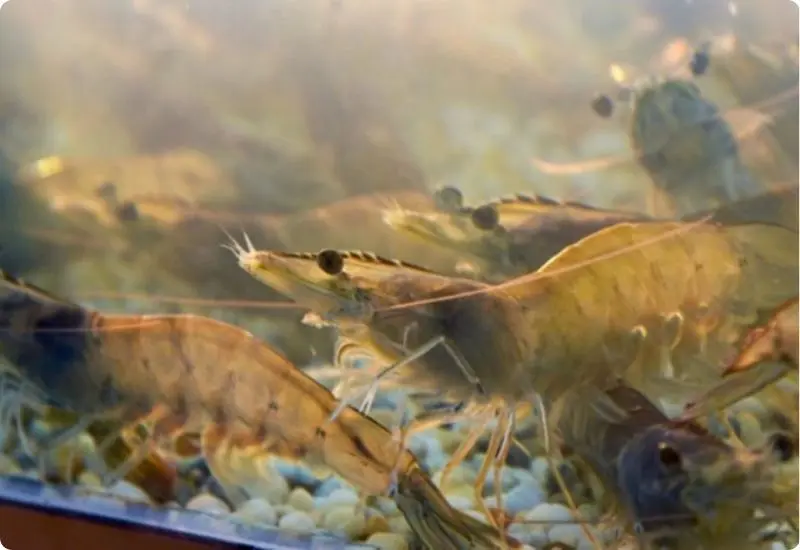
Regular Monitoring and Adjustments of Shrimp Farms
Nutrient Deficiencies and Their Effects on Shrimp
Shrimp farming practices, such as high stocking densities and low salinity ponds, can lead to mineral deficiencies. These issues may cause slower growth, reduced disease resistance, and molting problems. Addressing deficiencies requires adjusting mineral supplementation to suit shrimp’s developmental stages.
How to Optimize Mineral Use in Shrimp Farming
To maximize shrimp health and productivity, farmers should focus on providing high-quality organic minerals and adjusting supplementation frequency based on shrimp growth stages. Additionally, maintaining a clean pond environment minimizes stress and enhances mineral absorption
Conclusion
Minerals are indispensable for the growth, health, and reproduction of shrimp. Whether in aquariums or aquaculture ponds, maintaining a balanced mineral supply ensures robust shrimp populations and optimal productivity. By understanding the specific mineral needs of shrimp and implementing effective supplementation strategies, aquarists and farmers can create thriving ecosystems for these vital aquatic creatures.
For more insights into minerals for shrimp and their benefits in aquaculture, stay updated with the latest research and farming techniques.
Related Articles
What Happens When a Shrimp Molts?
Shrimp molting is a critical process in the life cycle of shrimp, where they shed their old ...
How Can We Make Shrimp Farming More Sustainable?
The shrimp farming industry in Vietnam has emerged as a cornerstone of the nation's aquaculture ...
How big can tiger shrimp grow?
Tiger shrimp , including the highly sought-after black tiger shrimp, is a lucrative species in the ...
What Factors Influence Shrimp Growth Rates?
Shrimp cultivation has become an increasingly profitable sector due to rising global demand. ...
Discover the Hidden Health Benefits of Shrimp
Shrimp is more than just a versatile and delicious seafood; it’s a nutrient-packed option that ...
What Are Pond Nutrients and Why Do They Matter?
Pond nutrients are a vital element of aquatic ecosystems, providing the essential "fuel" for plant ...

